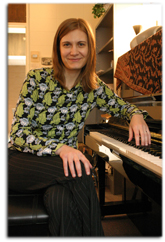From the mouth of a musicologist: music not just about enjoyment
April 2, 2007
Jessie Fillerup, lecturer of music and musicologist, came to Washburn four years ago at the age of 27.
“Being younger than a lot of the faculty didn’t really matter,” said Fillerup. “They treat me with respect and I don’t feel like a child. I feel like a younger colleague.”
The faculty that welcomed her to the music department four years ago seems to have made a great impression on the young brunette. Her voice is soft and slow as she chooses words to flatter those she works with.
“I think that we’re very fortunate here when it comes to personnel and to have great teachers,” she said.
Her own teachers left an impression as well.
Fillerup found her first influential teacher at Chine, a Navajo reservation in Arizona, where she lived when she was a toddler. Although Fillerup began playing her main instrument, the piano, at the tender age of 4, it wasn’t until she turned 9 that she studied it continuously.
“My parents had initially gotten me started on the piano because they thought I had an ear for music,” said Fillerup. “I was never expected to be a professional.”
When she restarted her studies of the piano, her teacher was both nurturing and strict.
“That balance isn’t something that you can find in a lot of people,” sad Fillerup. “I wasn’t a very disciplined student naturally, but under her tutelage I became a disciplined teacher.”
But Fillerup outgrew her teacher and moved on to a new one. Her next teacher focused on the musical expression. She allowed Fillerup to explore the repertoire available and choose what she was interested in.
“It was really smart because if I was able to choose what I liked then I’d practice for hours and hours to learn it,” said Fillerup.
When she started college, Fillerup surprised her last piano teacher, Rex Woods.
“I had initially auditioned on tape and since my first name can be misleading, my teacher was expecting a boy,” said Fillerup. “He got me instead.”
Despite the initial confusion, Fillerup looks back on her memories of Woods softly.
“I was really lucky to have a teacher who respected what I’d been taught before,” she said.
It was at the University of Arizona that Fillerup really discovered what she wanted to do as a career.
“It was when I was writing pages and pages of notes for one of my recital’s that I really discovered that I might want to go into musicology,” said Fillerup.
She describes musicology as being very broad, having “a little bit of everything – cultural studies and historical analysis.”
Woods encouraged Fillerup to find a compromise between performance and musicology.
“Ideally, after I get my dissertation done, I will be able to incorporate both into my career a little bit more,” she said.
Fillerup teaches Enjoyment of Music, Music History I and Music History II, where she focuses on analyzing the concept of music and its likeability.
“In my classes, especially my general education class, I’m not concerned that they come away with an appreciation and liking of music, even though it’s called Enjoyment of Music,” said Fillerup. “I’m much more concerned that my students will be able to rationalize and understand why they make the decision to like one kind of music or another.”



